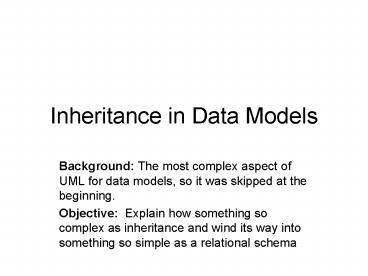Inheritance in Data Models - PowerPoint PPT Presentation
1 / 9
Title:
Inheritance in Data Models
Description:
pk clientId. fk clientId. fk clientId. 1. 0..1 ... where c.clientId = ci.clientId. A real solution? The result of a query, logically, is a table, ... – PowerPoint PPT presentation
Number of Views:29
Avg rating:3.0/5.0
Title: Inheritance in Data Models
1
Inheritance in Data Models
- Background The most complex aspect of UML for
data models, so it was skipped at the beginning. - Objective Explain how something so complex as
inheritance and wind its way into something so
simple as a relational schema
2
UML Subtypes - Standard Inheritance Notation
3
Subtype Entities
- Subtype entity is an entity that represents a
special case of another entity, called supertype - Sometimes called an IS-A relationship
- Entities with an IS-A relationship should have
the same identifier
// inheritance
4
How can subtypes become tables?
- In Java, new subclass is a new class,
- all the details are hidden from you.
- just use the name of the subclass
- Data modeling, same behavior,
- the UML tool will worry the details
- details wont be hidden
5
Example Subtype Entities
6
Inheritance as a Foreign Keythis is what
Rational Rose does
1
0..1
1
fk clientId
pk clientId
0..1
fk clientId
- Advantage Collecting information common to
subtypes requires mentioning just one table. - e.g. for all clients, find total amount due.
7
Inheritance as a Foreign Key
1
0..1
1
fk clientId
pk clientId
0..1
fk clientId
Disadvantage accessing all attributes of a an
object requires a foreign key join.
Solution Use views, createview
INDIVIDUAL-CLIENTview as select from CLIENT c,
INDIVIDUAL-CLIENT ic where c.clientId
ci.clientId A real solution?
8
One more SQL DDL Views defintions
1
0..1
1
fk clientId
pk clientId
0..1
fk clientId
- The result of a query, logically, is a table,
- view name can be used anywhere a table name is
used. - Rose does not generate the view definitions. (it
should)
createview INDIVIDUAL-CLIENTview as select
from CLIENT c, INDIVIDUAL-CLIENT ic where
c.clientId ci.clientId A real solution?
9
Second Method Flattening
create table CLIENT ClientNumber numeric,
ClientName varchar(99), AmountDue numeric
create table INDIVIDUAL-CLIENT ClientNumber
numeric, ClientName varchar(99), AmountDue
numeric, Address varchar(99), SocialSecurityNumb
er varchar(9)
create table CORPORATE-CLIENT ClientNumber
numeric, ClientName varchar(99), AmountDue
numeric, ContactPerson varchar(99), Phone
varchar(10), TaxIdentificationNumber varchar(9)
- Advantage Contents of each subtype clearly
identifiable. - e.g. tableName.attribute
- Disadvantage Collecting information common to
subtypes requires mentioning each, every table - e.g. for all clients, find total amount due.































